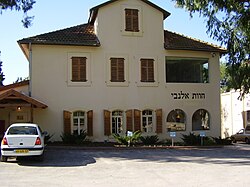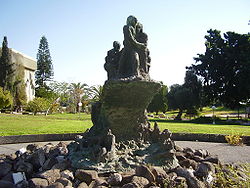Netzer Sereni
Netzer Sereni
| |
|---|---|
 Havat Allenby | |
| Coordinates: 31°55′21″N 34°49′20″E / 31.92250°N 34.82222°E | |
| Country | Israel |
| District | Central |
| Council | Gezer |
| Affiliation | Kibbutz Movement |
| Founded | 20 June 1948 |
| Founded by | Holocaust survivors |
| Population (2023)[1] | 1,083 |

Netzer Sereni (Hebrew: נֵצֶר סֶרֶנִי) is a kibbutz in central Israel. Located in the Shephelah between Be'er Ya'akov and Ness Ziona, it falls under the jurisdiction of Gezer Regional Council. In 2023 it had a population of 1,083.[1]
History
[edit]Kibbutz Netzer Sereni was founded in 1948 by Holocaust survivors liberated from Buchenwald concentration camp, who had established themselves in 1945 as "Kibbutz Buchenwald", an agricultural collective designed to prepare Jews for life in Palestine, the first such Hakhshara group established in Germany after the war.[2][3][4][5] The kibbutz was established on the land of the Palestinian village of Bir Salim, which was evacuated in 1948 under orders from authorities in nearby Ramle, despite requests from the local mukhtar to the Haganah asking for protection.[6][7] In October 1949, the name was changed to "Netzer" (a Hebrew word meaning "scion", "shoot", "sprout") by the Government Naming Committee.
Between 1948 and 1951 antagonism between the Mapam and Mapai parties led to a split within the kibbutz movement,[8][9] and in 1952 120 Mapai members of kibbutz Givat Brenner broke away for ideological reasons and moved to Netzer Sereni.[10]
In 1952, following the arrival of roughly fifty families from Givat Brenner, they requested to rename the kibbutz Netzer Sereni after Enzo Sereni, a Jewish Italian intellectual, Zionist leader and Jewish Brigade officer.[11] Sereni was one of the founders of Givat Brenner. He was parachuted into Nazi-occupied Italy in World War II, only to be immediately captured by the Germans and executed in Dachau concentration camp.[10]
The Government Naming Committee objected to the usage of the non-Hebrew name "Sereni", and ordered the kibbutz to adopt the name "Netzer Haim", "haim" meaning "life" in Hebrew and having been Enzo Sereni's Hebrew name. The poet Natan Alterman advocated for the usage of "Netzer Sereni" in his column in the Davar newspaper. Mapai Knesset member Haim Ben-Asher, a kibbutz member who had been a personal friend of Enzo Sereni, felt an obligation to honor Sereni's original name. In January 1955, he began legislative proceedings designed to force the Government Naming Committee to adopt the name "Netzer Sereni", on the grounds that following the tragic death of Enzo Sereni's only son Daniel in a plane crash over Maagan the previous year, the name "Sereni" had been discontinued. In June 1955, the Government Naming Committee announced that although it continued - and would continue - to keep the Hebrew name, it agreed, out of respect for the Knesset, to change the name of the settlement to "Netzer Sereni."
In popular culture
[edit]The 2023 Israeli musical film Victory focuses on two fictional couples from Netzer Sereni.[12]
Notable people
[edit]References
[edit]- ^ a b "Regional Statistics". Israel Central Bureau of Statistics. Retrieved 11 August 2025.
- ^ Judith Tydor Baumel, Kibbutz Buchenwald: Survivors And Pioneers, Rutgers University Press, 1997, ISBN 9780813523378 [1] Archived 2018-06-26 at the Wayback Machine
- ^ Erhard Roy Wiehn (ed.), Wer hätte das geglaubt, Hartung-Gorre Verlag, 2010, Konstanz [2] Archived 2023-06-06 at the Wayback Machine
- ^ November 12, 1945, The dining room of Kibbutz Buchenwald, Germany Archived August 20, 2023, at the Wayback Machine, Yad Vashem website
- ^ March 1946, Members of the “Kibbutz Buchenwald” Pioneer Training Group in Antwerp, Belgium Archived 2023-08-20 at the Wayback Machine, Yad Vashem website
- ^ Morris, Benny (2004). The Birth of the Palestinian Refugee Problem Revisited. Cambridge University Press. p. xx, settlement #11. ISBN 978-0-521-00967-6. Archived from the original on 2024-10-14. Retrieved 2017-07-18.
- ^ Khalidi, Walid (1992). All That Remains: The Palestinian Villages Occupied and Depopulated by Israel in 1948. Washington D.C.: Institute for Palestine Studies. p. 371. ISBN 0-88728-224-5. Archived from the original on 2024-10-08. Retrieved 2017-07-18.
- ^ Kibbutz Movement in Israel Splits; Mapai Delegates Walk out of Mapam-Dominated Parley Archived 2018-06-27 at the Wayback Machine Jewish Telegraphic Agency, 23 May 1951
- ^ Marcia Drezon-Tepler (1990). Interest Groups and Political Change in Israel. State University of New York Press (SUNY Press). p. 104. ISBN 978-0-7914-0207-8. Retrieved 26 June 2018.
- ^ a b Daniel Gavron (2000) The Kibbutz: Awakening from Utopia Rowman & Littlefield, p59
- ^ Hareuveni, Imanuel (2010). Eretz Israel Lexicon Archived 2023-03-12 at the Wayback Machine (in Hebrew). Matach. p. 701.
- ^ Israeli Film Series: Victory HaMenatzchim Archived 2024-07-08 at the Wayback Machine Toronto Jewish Film Festival. Retrieved on 8 July 2024
